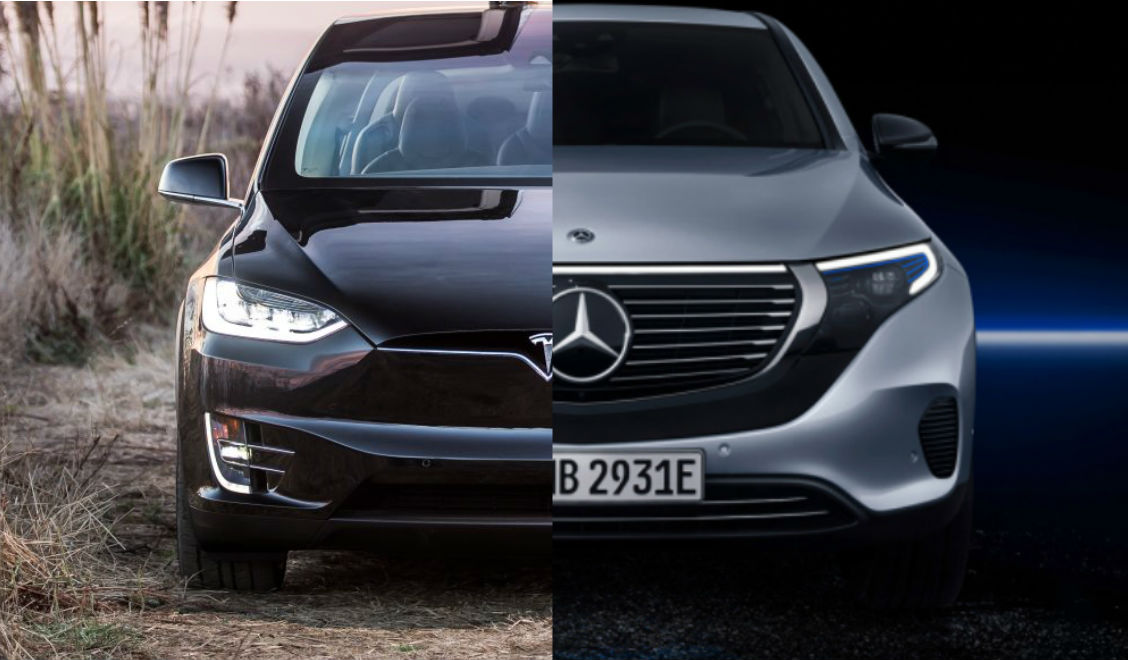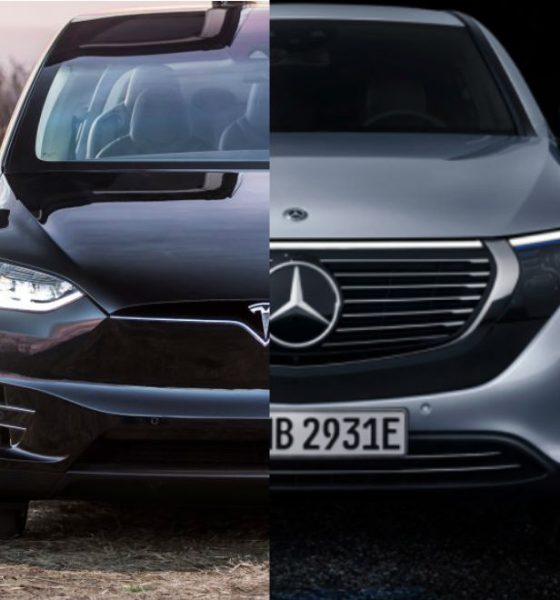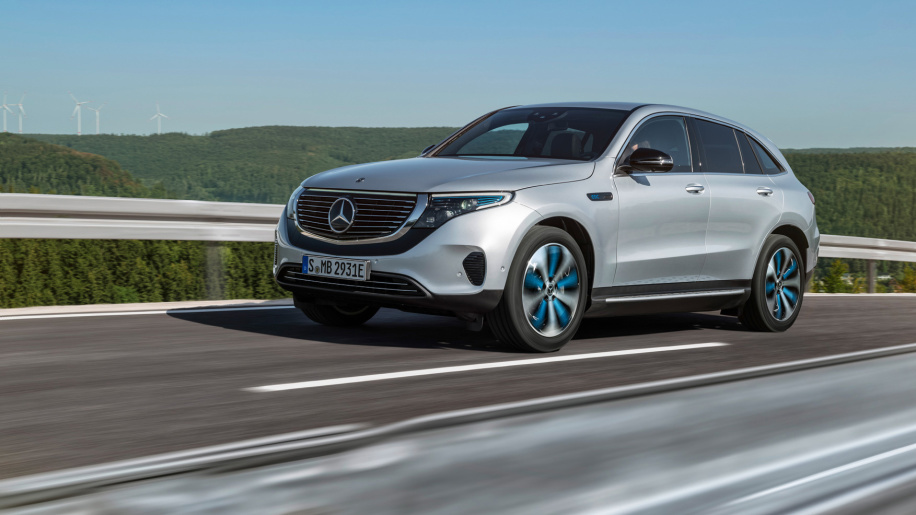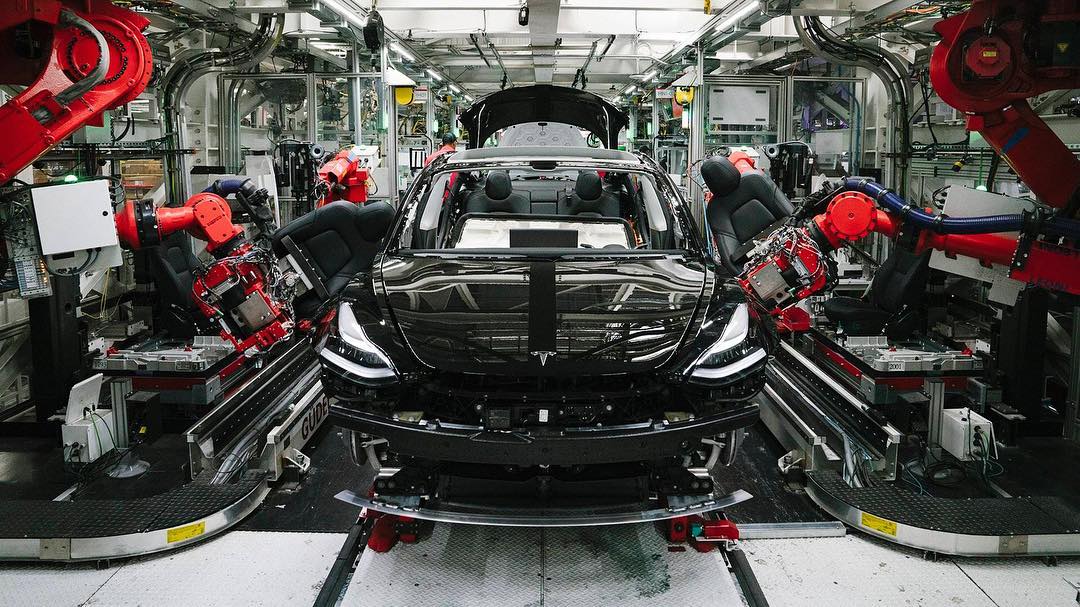

Investor's Corner
Tesla’s experience in electric cars emphasized anew after Mercedes EQC reveal
Earlier today, Tesla stock was given a Sell rating by Goldman Sachs, citing the arrival of competitors from established automakers. Some of these competitors are dubbed as “Tesla Killers,” such as the Jaguar I-PACE and the Mercedes-Benz EQC. The financial firm’s renewed Sell rating on Tesla appears to have affected the sentiment of some investors, resulting in TSLA stock ending the day down 4.21% at $288.95 per share.
Earlier today, the electric car industry also welcomed its latest vehicle from legacy automaker Mercedes-Benz. At an event in Stockholm, Sweden, Daimler AG Chief Executive Officer Dieter Zetsche unveiled the Mercedes-Benz EQC, an all-electric crossover SUV that symbolizes the company’s commitment to the upcoming electrification of the transport industry.
“There is no alternative to betting on electric cars, and we’re going all in. It is starting right now,” Zetsche said.
Mercedes-Benz tried hard with the EQC, with Zetsche stating that the vehicle will be profitable, and that it would “offer the best package” compared to rivals. The EQC also looks very much like a conventional Merc SUV, with its almost understated lines, its high ground clearance, and its tough stance. The EQC’s basic specs are quite decent, with two electric motors that produce 402 hp and 564 lb-ft of torque. The SUV can accelerate from 0-60 mph in 4.9 seconds and hit a top speed of around 112 mph. That being said, the Mercedes-Benz EQC’s range and production date ultimately prove that it won’t be so easy for legacy automakers to gain EV expertise that is comparable to Tesla’s.
The Mercedes-Benz EQC is equipped with an 80 kWh battery pack, which puts its size between the base Model X’s 75 kWh battery pack and the Jaguar I-PACE’s 90 kWh battery. Despite its generous battery size, the EQC’s estimated range is very conservative at around 200 miles per charge. Charging the vehicle from 10% to 80% is also estimated to take around 40 minutes. The EQC’s apparent lack of range has not gone unnoticed. Alex Roy, a veteran of the auto industry, for one, noted that the EQC’s range was a big “miss” for the established German automaker.

In a way, this could be attributed to Mercedes-Benz’s lack of experience in designing and building all-electric cars. And it’s not just Mercedes-Benz, either. Jaguar’s I-PACE is listed with a 240-mile range, but informal, real-world tests online have noted that the vehicle’s battery consumption is quite high. The same could be true for the EQC. It might have a big enough battery, but it could prove to be the electric equivalent of a gas guzzler.
This is something that Tesla has refined over the years. Elon Musk has opted to develop Tesla’s battery packs and even its software in-house, allowing the company to create vehicles that just work. In terms of range, Tesla’s cars usually come very close to their rated range, in some instances even exceeding it. Even the Model X 75D — one of Tesla’s largest, heaviest offerings — could go as far as 237 miles with a 75 kWh battery. Tesla’s progress in developing and building electric cars ultimately cannot be discounted, as Volkswagen AG, a prominent German automaker, was one of the investors willing to help fund Tesla’s attempted privatization.
Another notable detail from the Mercedes-Benz EQC’s unveiling that validated Tesla’s experience in building electric cars is the German-made SUV’s production timeline. Mercedes expects to start manufacturing the EQC sometime next year, with deliveries beginning in 2020. Compared to Tesla’s hyper-aggressive timetables, Mercedes-Benz’s timeline is very conservative, especially considering that the automaker is looking to build the EQC in some of its existing facilities.
A Tesla Model 3 being assembled.
There is very little doubt that Tesla is the company that ultimately made electric cars desirable, proving to consumers that battery-powered vehicles are actually realistic alternatives to fossil fuel-powered cars. Since starting the production of the Tesla Roadster, the company has gained a lot of experience, a lot of it coming from trial and error. Over the years, Tesla has refined its battery technology, to the point where the company is now attempting to hit a battery pack cost of $100 per kWh. Its 2170 cells that power the Model 3 are also proving to be impressive, with Detroit veteran Sandy Munro praising it as some of the finest batteries he has ever analyzed.
A central part of the Tesla Killer thesis is that competitors from established automakers can easily catch up and overtake the California-based company with vehicles that are far superior in quality and performance. If the range and estimated delivery date of the Mercedes-Benz EQC are any indication, it appears that the arrival of these competitors might be just a little bit too late. After all, by 2020, Tesla is planning to start the production of the next-generation Tesla Roadster, a supercar to end all supercars. The Tesla Model Y, a CUV expected to be even more popular than the Model 3, would likely be in production by then as well.
Watch the Mercedes-Benz EQC’s unveiling in the video below.

Elon Musk
Tesla stock gets latest synopsis from Jim Cramer: ‘It’s actually a robotics company’
“Turns out it’s actually a robotics and Cybercab company, and I want to buy, buy, buy. Yes, Tesla’s the paper that turned into scissors in one session,” Cramer said.

Tesla stock (NASDAQ: TSLA) got its latest synopsis from Wall Street analyst Jim Cramer, who finally realized something that many fans of the company have known all along: it’s not a car company. Instead, it’s a robotics company.
In a recent note that was released after Tesla reported Earnings in late January, Cramer seemed to recognize that the underwhelming financials and overall performance of the automotive division were not representative of the current state of affairs.
Instead, we’re seeing a company transition itself away from its early identity, essentially evolving like a caterpillar into a butterfly.
The narrative of the Earnings Call was simple: We’re not a car company, at least not from a birds-eye view. We’re an AI and Robotics company, and we are transitioning to this quicker than most people realize.
Tesla stock gets another analysis from Jim Cramer, and investors will like it
Tesla’s Q4 Earnings Call featured plenty of analysis from CEO Elon Musk and others, and some of the more minor details of the call were even indicative of a company that is moving toward AI instead of its cars. For example, the Model S and Model X will be no more after Q2, as Musk said that they serve relatively no purpose for the future.
Instead, Tesla is shifting its focus to the vehicles catered for autonomy and its Robotaxi and self-driving efforts.
Cramer recognizes this:
“…we got results from Tesla, which actually beat numbers, but nobody cares about the numbers here, as electric vehicles are the past. And according to CEO Elon Musk, the future of this company comes down to Cybercabs and humanoid robots. Stock fell more than 3% the next day. That may be because their capital expenditures budget was higher than expected, or maybe people wanted more details from the new businesses. At this point, I think Musk acolytes might be more excited about SpaceX, which is planning to come public later this year.”
He continued, highlighting the company’s true transition away from vehicles to its Cybercab, Optimus, and AI ambitions:
“I know it’s hard to believe how quickly this market can change its attitude. Last night, I heard a disastrous car company speak. Turns out it’s actually a robotics and Cybercab company, and I want to buy, buy, buy. Yes, Tesla’s the paper that turned into scissors in one session. I didn’t like it as a car company. Boy, I love it as a Cybercab and humanoid robot juggernaut. Call me a buyer and give me five robots while I’m at it.”
Cramer’s narrative seems to fit that of the most bullish Tesla investors. Anyone who is labeled a “permabull” has been echoing a similar sentiment over the past several years: Tesla is not a car company any longer.
Instead, the true focus is on the future and the potential that AI and Robotics bring to the company. It is truly difficult to put Tesla shares in the same group as companies like Ford, General Motors, and others.
Tesla shares are down less than half a percent at the time of publishing, trading at $423.69.
Elon Musk
Tesla to a $100T market cap? Elon Musk’s response may shock you

There are a lot of Tesla bulls out there who have astronomical expectations for the company, especially as its arm of reach has gone well past automotive and energy and entered artificial intelligence and robotics.
However, some of the most bullish Tesla investors believe the company could become worth $100 trillion, and CEO Elon Musk does not believe that number is completely out of the question, even if it sounds almost ridiculous.
To put that number into perspective, the top ten most valuable companies in the world — NVIDIA, Apple, Alphabet, Microsoft, Amazon, TSMC, Meta, Saudi Aramco, Broadcom, and Tesla — are worth roughly $26 trillion.
Will Tesla join the fold? Predicting a triple merger with SpaceX and xAI
Cathie Wood of ARK Invest believes the number is reasonable considering Tesla’s long-reaching industry ambitions:
“…in the world of AI, what do you have to have to win? You have to have proprietary data, and think about all the proprietary data he has, different kinds of proprietary data. Tesla, the language of the road; Neuralink, multiomics data; nobody else has that data. X, nobody else has that data either. I could see $100 trillion. I think it’s going to happen because of convergence. I think Tesla is the leading candidate [for $100 trillion] for the reason I just said.”
Musk said late last year that all of his companies seem to be “heading toward convergence,” and it’s started to come to fruition. Tesla invested in xAI, as revealed in its Q4 Earnings Shareholder Deck, and SpaceX recently acquired xAI, marking the first step in the potential for a massive umbrella of companies under Musk’s watch.
SpaceX officially acquires xAI, merging rockets with AI expertise
Now that it is happening, it seems Musk is even more enthusiastic about a massive valuation that would swell to nearly four-times the value of the top ten most valuable companies in the world currently, as he said on X, the idea of a $100 trillion valuation is “not impossible.”
It’s not impossible
— Elon Musk (@elonmusk) February 6, 2026
Tesla is not just a car company. With its many projects, including the launch of Robotaxi, the progress of the Optimus robot, and its AI ambitions, it has the potential to continue gaining value at an accelerating rate.
Musk’s comments show his confidence in Tesla’s numerous projects, especially as some begin to mature and some head toward their initial stages.
Elon Musk
Tesla director pay lawsuit sees lawyer fees slashed by $100 million
The ruling leaves the case’s underlying settlement intact while significantly reducing what the plaintiffs’ attorneys will receive.

The Delaware Supreme Court has cut more than $100 million from a legal fee award tied to a shareholder lawsuit challenging compensation paid to Tesla directors between 2017 and 2020.
The ruling leaves the case’s underlying settlement intact while significantly reducing what the plaintiffs’ attorneys will receive.
Delaware Supreme Court trims legal fees
As noted in a Bloomberg Law report, the case targeted pay granted to Tesla directors, including CEO Elon Musk, Oracle founder Larry Ellison, Kimbal Musk, and Rupert Murdoch. The Delaware Chancery Court had awarded $176 million to the plaintiffs. Tesla’s board must also return stock options and forego years worth of pay.
As per Chief Justice Collins J. Seitz Jr. in an opinion for the Delaware Supreme Court’s full five-member panel, however, the decision of the Delaware Chancery Court to award $176 million to a pension fund’s law firm “erred by including in its financial benefit analysis the intrinsic value” of options being returned by Tesla’s board.
The justices then reduced the fee award from $176 million to $70.9 million. “As we measure it, $71 million reflects a reasonable fee for counsel’s efforts and does not result in a windfall,” Chief Justice Seitz wrote.
Other settlement terms still intact
The Supreme Court upheld the settlement itself, which requires Tesla’s board to return stock and options valued at up to $735 million and to forgo three years of additional compensation worth about $184 million.
Tesla argued during oral arguments that a fee award closer to $70 million would be appropriate. Interestingly enough, back in October, Justice Karen L. Valihura noted that the $176 award was $60 million more than the Delaware judiciary’s budget from the previous year. This was quite interesting as the case was “settled midstream.”
The lawsuit was brought by a pension fund on behalf of Tesla shareholders and focused exclusively on director pay during the 2017–2020 period. The case is separate from other high-profile compensation disputes involving Elon Musk.








